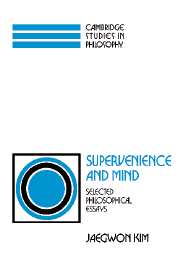Book contents
- Frontmatter
- Contents
- Preface
- Sources
- Part I Events and supervenience
- Part II Mind and mental causation
- 10 Psychophysical supervenience
- 11 Psychophysical laws
- 12 What is “naturalized epistemology”?
- 13 Mechanism, purpose, and explanatory exclusion
- 14 The myth of nonreductive materialism
- 15 Dretske on how reasons explain behavior
- 16 Multiple realization and the metaphysics of reduction
- 17 The nonreductivist's troubles with mental causation
- 18 Postscripts on mental causation
- Index
10 - Psychophysical supervenience
Published online by Cambridge University Press: 28 January 2010
- Frontmatter
- Contents
- Preface
- Sources
- Part I Events and supervenience
- Part II Mind and mental causation
- 10 Psychophysical supervenience
- 11 Psychophysical laws
- 12 What is “naturalized epistemology”?
- 13 Mechanism, purpose, and explanatory exclusion
- 14 The myth of nonreductive materialism
- 15 Dretske on how reasons explain behavior
- 16 Multiple realization and the metaphysics of reduction
- 17 The nonreductivist's troubles with mental causation
- 18 Postscripts on mental causation
- Index
Summary
Suppose we could create an exact physical replica of a living human being - exactly like him cell for cell, molecule for molecule, atom for atom. Such a replica would be indistinguishable, at least physically, from the original. For we are supposing that the replica is a perfect physical copy in every detail. The idea of such a replica, whether artificially created or naturally found, is a perfectly coherent one; in fact, it is consistent with all known laws of nature. The idea of course is a commonplace in science fiction.
Given that your replica and you are exactly alike physically, will you also share your psychological life with him? Will your replica have your psychological traits and dispositions, intellectual powers and artistic gifts, anxieties and depressions, likes and dislikes, and virtues and vices? Will it feel pain, remorse, joy and elation exactly in the way you do? That is, if two organisms have identical physical features, will they be identical in psychological characteristics as well?
According to many moral theorists, any two things sharing the same ‘naturalistic’ or ‘descriptive’ features cannot differ in respect of moral or evaluative properties. Thus, it has been said that if St. Francis is a good man, anyone who is just like him in all naturalistic respects - in this case, broadly psychological properties, such as traits of character and personality - must of necessity be a good man.
- Type
- Chapter
- Information
- Supervenience and MindSelected Philosophical Essays, pp. 175 - 193Publisher: Cambridge University PressPrint publication year: 1993
- 7
- Cited by

